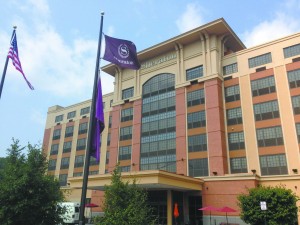After six years of lobbying for a local hotel occupancy tax that could bring in hundreds of thousands of dollars in revenue each year, Greenburgh Town Supervisor Paul J. Feiner was granted his wish by the New York Legislature.
Before leaving Albany at the close of the 2015 legislative session, state lawmakers approved a bill that would allow the town of Greenburgh, its six villages and a neighboring Rivertowns village to impose a 3 percent hotel occupancy tax on its guests.
In addition to signing that bill, Gov. Andrew Cuomo on Thursday also approved legislation implementing a 3 percent local hotel tax in Port Chester, Harrison, Mamaroneck, Tuckahoe and Yonkers.
Though a revenue boost to municipalities, the new hotel taxes were criticized by hotel officials in Westchester and the county”™s largest business group.
Greenburgh as well as its incorporated villages of Ardsley, Dobbs Ferry, Elmsford, Hastings-on-Hudson, Irvington and Tarrytown, along with the village of Sleepy Hollow, were approved to impose the tax. It will be tacked on to the existing 3 percent hotel occupancy tax levied by Westchester County.
Feiner said he hopes the tax will go into effect next year.
“It will generate significant revenue for the town,” he said. “It also addresses an inequity. It”™s not fair if White Plains has a tax but Greenburgh does not.”
Feiner estimated the tax could generate between $200,000 and $500,000 in annual revenue from the roughly 2,000 hotel rooms in Greenburgh. He said the town, which has been seeking a hotel tax since 2009, will use the revenue to reduce property tax bills and comply with the 2 percent cap on annual increases to the property tax levy.
No hotels currently operate in Hastings-on-Hudson, Dobbs Ferry, Irvington and Sleepy Hollow. But Dobbs Ferry stands to reap tax revenue from the completed Rivertowns Square development now under construction, which includes plans for a 123-room hotel. In Sleepy Hollow, a mixed-use development approved on the site of the former General Motors automotive plant, Lighthouse Landing, will include a 140-room hotel.
Assemblyman Thomas J. Abinanti, the Greenburgh Democrat who sponsored the hotel tax bill with state Sen. Andrea Stewart-Cousins, the Democrat from Yonkers, said the tax will be a lasting benefit to Greenburgh.
“This will ease the burden on local property taxpayers by imposing a user fee on out-of-towners who benefit from using public services provided by our towns and villages,” Abinanti said.
But the tax has not gone without its fair share of opposition.
Rich Friedman, general manager at the DoubleTree hotel in Tarrytown, said he and other hotel managers in the area had vehemently opposed the bill. He said the new tax would create an uneven playing field for Greenburgh hotels that now have to compete with other hotels in the region that do not charge the additional local tax.
“It puts us at a competitive disadvantage,” Friedman said. “Now people might start thinking of staying in Rockland County or Stamford instead of here. You put an additional 6 percent on 100 bucks, then that starts to add up.”
John Ravitz, executive vice president and chief operating officer of The Business Council of Westchester, saw the bill as detrimental to companies and organizations that account for a significant portion of the Greenburgh hotel business.
“The hotel tax bill sends a terrible message to businesses as well as conferences and trade associations that use our hotels,” he said.
According to figures provided by Westchester County Tourism & Film, a county office funded entirely by a portion of the county hotel occupancy tax, the county has a $1.7 billion tourism industry. In 2013, visitors spent a total of $361.7 million on lodging in the county, which saw its average daily room rate for hotels grow 3 percent from the previous year to $152.
The state Legislature over the last nine years has approved local hotel taxes for the cities of White Plains, New Rochelle and Rye and the village of Rye Brook. In Rye Brook, the village”™s previous mayor, Joan Feinstein, led an effort to implement a tax for its two hotels, Doral Arrowwood and the Hilton Westchester, formerly the Rye Town Hilton. Former Gov. David Paterson authorized the bill in August 2010, making Rye Brook the county”™s first village to have its own hotel occupancy tax.
Rye Brook Mayor Paul S. Rosenberg said that the village”™s hotel tax brought in $568,000 in revenue last year and is projected to account for $552,000 in the current fiscal year. The income has been used to fund capital projects such as road repaving and senior citizen and recreation programs. Despite initial opposition from hotels, Rosenberg said the tax”™s revenue figures speak for themselves.
“The tax has been a tremendous boost for us,” he said.” It”™s allowed us to continue to offer services to village residents yet stay within the tax cap. It”™s certainly been a big help to the village.”
















